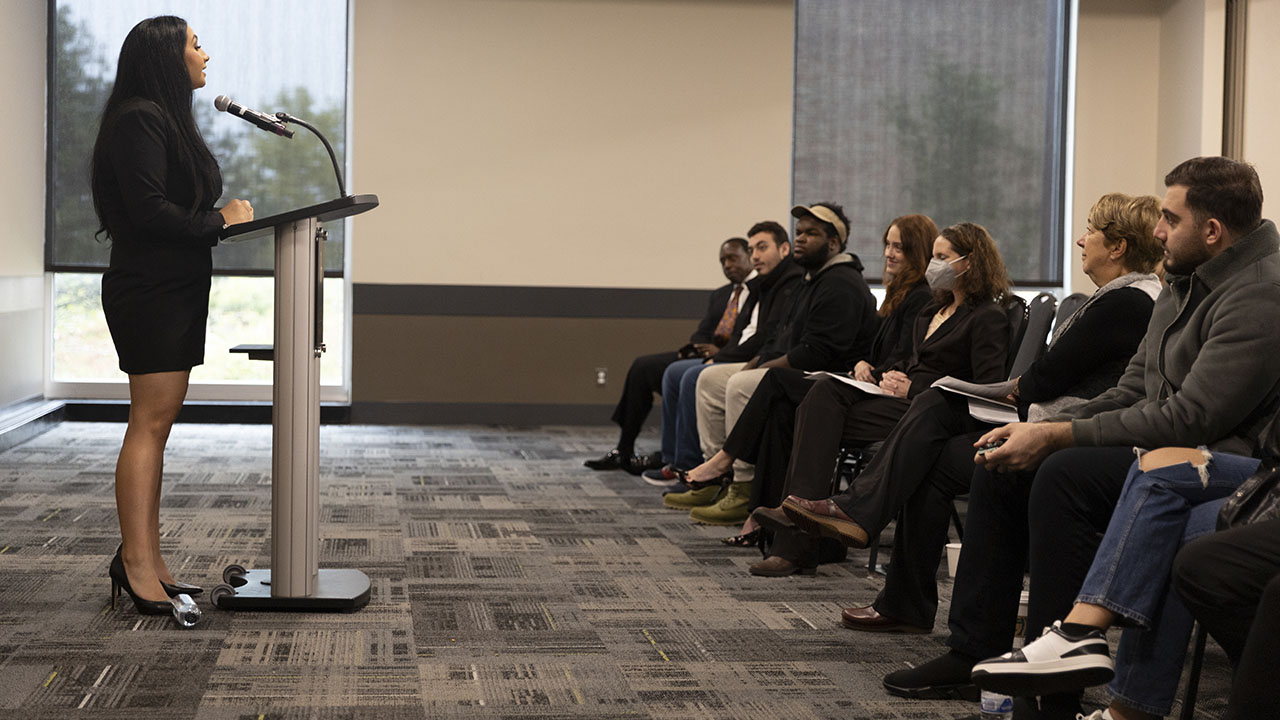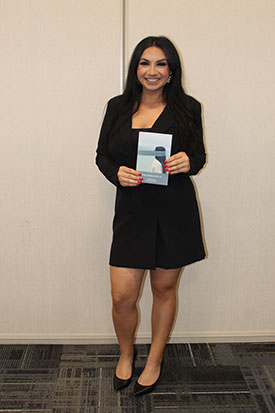Writing and Rhetoric graduate flourishes after finding her unique voice

Spend a few minutes talking to Oakland senior Mena Hannakachl and you’ll likely walk away impressed with what she’s been able to accomplish during her time at OU and what she hopes to accomplish in the future.
Hannakachl was recently awarded the College of Arts and Sciences Meritorious Achievement Award and will speak at commencement.
It’s the latest accomplishment for Hannakachl, who won the 2023 Oakland University Keeper of the Dream scholarship and published her memoir “What Chaldean Girls Are.”
But there was a time when Hannakachl wasn’t sure how she would fare in college, and when she arrived at Oakland, she was placed in a basic writing course based on her standardized test score.
It proved to be a blessing in disguise. Hannakachl met her mentor in the basic writing class, and more importantly she found her confidence and her voice.
"I think I slowly realized the power of my voice,” Hannakachl said. “I think when you find your voice, you realize you have the power to accomplish so many things. I realized that if I put myself out there and submitted this thing or pitched this idea, there was a possibility it could happen. You don't do things for recognition, but sometimes the aftermath is being recognized or being seen. I think I've been really fortunate and grateful that my community has done that and recognized me.”

Oakland senior Mena Hannakachl holding her memoir essay, “What Chaldean Girls Are.”
Hannakachl is extremely thankful she met her mentor Cathy Rorai, who is a special lecturer in the Department of Writing and Rhetoric, in the basic writing course. Hannakachl credits Rorai with helping her build her confidence.
“She helped me realize I have a story to share,” Hannakachl said. “I asked her if I could do more writing like we did in class and she introduced me to the Writing and Rhetoric program. I also found out I could mentor other students and I went on to work for the department for the last three years.”
Hannakachl was born in Iraq. She moved to the United Arab Emirates when she was four to flee the war in Iraq. Her family moved to the United States eight years ago in hopes Hannakachl and her siblings would have more opportunities.
Growing up in the United Arab Emirates, Hannakachl learned three languages: Arabic, Chaldean and English. So while she knew English well, it wasn’t necessarily her primary language when she moved to the United States.
Hannakachl used her life experiences for her first writing assignment in Rorai’s class. The writing assignment was eventually repurposed and expanded on to create Hannakachl’s memoir essay, “What Chaldean Girls Are.”
“As a non-traditional student with an immigrant background, Mena had come to believe that she needed to totally immerse herself in American culture,” Rorai said. “She believed that talking or writing about her culture, journey and personal story were not appropriate topics in a college classroom. The turning point came when she discovered that she could use her authentic and very powerful voice not only to tell her story, but to advocate for students struggling with the same self-doubt that she had.”
Hannakachl became an embedded writing specialist for the basic writing course so she could help others who were struggling with confidence like she was when she first arrived at Oakland. She also had added credibility as a former student in the class.
“I think I was able to kind of validate and affirm their experiences,” Hannakachl said. “A lot of students who are placed in basic writing think that they are not good writers because of their language and because of their background, and they don't have to be multilingual or immigrants to necessarily feel that. I’ve worked with students who are adult learners or who have a learning disability. A lot of my work was confidence building.”
Rorai said Hannakachl was a huge asset to the basic writing course and nearly everywhere she went.
“What is most admirable about Mena is the way that she has lifted other students in every classroom or campus experience she’s engaged with,” Rorai said. “She encourages everyone to do what she has learned: tell your story, take pride in your culture and history because your story has value. Once the students feel heard and seen, their confidence grows, and they begin to see themselves as competent and capable.
“Every accomplishment and award that she’s earned was the result of her wanting to share what she’s learned about her own success with others. Mena entered Oakland University at the most basic level, yet she proactively took advantage of every opportunity to grow and give back to the campus community as a scholar, citizen and leader.”
In addition to being an embedded writing specialist, Hannakachl also worked as a peer mentor at the Center for Multicultural Initiatives and as an undergraduate admissions ambassador.
“If students take one thing from their tour with me, it’s to be involved and put yourself out there and establish your presence on campus,” Hannakachl said of her work as an admissions ambassador. “Our community enables students and gives them the opportunity to share their voice. All students have to do is seek out those opportunities and pursue them.”
Hannakachl is now co-authoring a book chapter with Felicita Arzu-Carmichael, who is Oakland’s associate director of first-year writing. The chapter is on racial microaggressions.
“She analyzes exclusionary educational practices that put early-career faculty and undergraduate students at risk,” said Megan Schoen, associate professor and chair of the Department of Writing and Rhetoric. “Drawing from her own experiences as a student of color, she aims to shed light on the possibilities for social justice leadership, workplace activism and student empowerment within writing classrooms.”
Hannakachl’s family moved to the U.S. in hopes of finding more opportunities. She was able to find those opportunities at Oakland, something her family is thrilled to see.
“I have a joke that I say my family might not always understand everything that I do, but they support me,” Hannakachl said. “What I did, anyone can do. I wanted to be involved and make connections, anyone can do that. If you find your voice, you can do anything.”

 April 19, 2024
April 19, 2024







